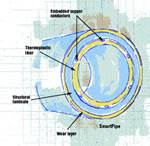Thermoplastic tubulars: Robust flexibility for offshore wells
In the oil and gas industry, a fiber-reinforced thermoplastic composite pipe (TCP) system from Airborne Composite Tubulars (The Hague, The Netherlands) is providing a less-expensive alternative to the traditional “rig” for flushing subsea wellhead stacks and injecting glycol under pressure.
In the oil and gas industry, increased oil recovery (IOR) from existing wells is a priority, and well intervention (for diagnostics, inspection, maintenance, or production improvements) plays a vital role. Intervention on subsea wells, historically, has required a traditional but expensive “rig” to flush subsea wellhead stacks and inject glycol under pressure. Today, offshore operators, such as TSMarine (Aberdeen, Scotland, U.K.), are turning instead to riserless (rigless) alternatives that circulate fluids using more cost-effective composite tubulars.
One option is a fiber-reinforced thermoplastic composite pipe (TCP) system from Airborne Composite Tubulars, a business unit of Airborne International (The Hague, The Netherlands). The company’s managing director, Martin van Onna, says TCP’s “one-material concept” optimizes the structural interfaces between layers and largely eliminates rapid decompression issues. “This pipe structure consists of a liner reinforced with melt-fused carbon or glass fiber tapes,” explains van Onna. Preimpregnated with the same thermoplastic compound as the liner, which can range from polyethylene (PE) to polyetheretherketone (PEEK), the tapes are sourced from Ten Cate Advanced Composites (Nijverdal, The Netherlands), Ticona (Florence, Ky.) and Suprem SA (Yverdon-les-Bains, Switzerland). “Melt-fusing fiber tapes onto the tubular enables longitudinal reinforcement, creating a pipe with high tensile strength and allowing for sufficient spoolability without fatigue,” he explains. “The pipe is then coated again using the same thermoplastic material, which results in a fully bonded pipe system without any adhesives.”
TCP intervention lines reportedly outlast those made of steel coiled tubing, which has a short 30- to 50-cycle useful life and low chemical resistance; they also outlast thermoset composite tubulars, which are considerably more brittle than thermoplastics. According to van Onna, high tensile strength, collapse ratings and internal pressure ratings give TCPs great potential in a variety of applications. In fact, Airborne reports that 10 TCP projects will be fielded this year for companies such as StatoilHydro (Stavanger, Norway) and Shell (The Hague, The Netherlands), not only for subsea intervention but riser and drilling applications as well.
Related Content
-
Plant tour: Teijin Carbon America Inc., Greenwood, S.C., U.S.
In 2018, Teijin broke ground on a facility that is reportedly the largest capacity carbon fiber line currently in existence. The line has been fully functional for nearly two years and has plenty of room for expansion.
-
Plant tour: Collins Aerospace, Riverside, Calif., U.S. and Almere, Netherlands
Composite Tier 1’s long history, acquisition of stamped parts pioneer Dutch Thermoplastic Components, advances roadmap for growth in thermoplastic composite parts.
-
Plant tour: Airbus, Illescas, Spain
Airbus’ Illescas facility, featuring highly automated composites processes for the A350 lower wing cover and one-piece Section 19 fuselage barrels, works toward production ramp-ups and next-generation aircraft.


